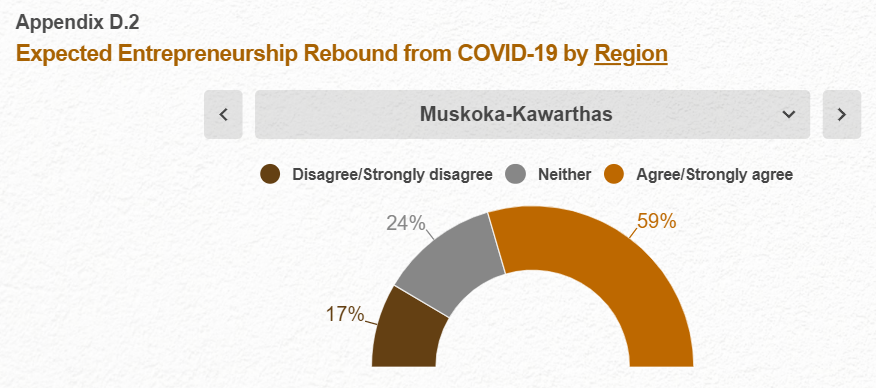Pain points throughout Ontario’s economy are impairing business operations, and now consumers are feeling the pinch, too. The frustration is palpable. From the grocery to entertainment venues to their pocketbooks, Ontarians are experiencing the very real consequences of labour shortages, global supply chain disruptions, and inflation. Today, the Muskoka Lakes Chamber of Commerce and the Ontario Chamber of Commerce (OCC) released the sixth annual Ontario Economic Report (OER) providing regional and sector-specific data on business confidence, policy priorities, and economic indicators, which together provide a unique view on the hurdles ahead.
“Ontario began to see some positive momentum in 2021 thanks to progress on vaccines and reopening. Business confidence, GDP, and employment growth are trending upwards after record lows in 2020. However, the road ahead remains uncertain for businesses and households as labour shortages, supply chain disruptions, and inflation are hitting home,” said Rocco Rossi, President and CEO, Ontario Chamber of Commerce. “A staggering 62 per cent of sectors are facing labour shortages in Ontario and expect to continue facing them over the next year. This is having real-life consequences on the cost of living, service delivery, and product availability.”
Not surprisingly, of the 158 respondents to the survey in the Muskoka-Kawarthas region, 54 per cent agreed the labour shortage problem was a number one barrier for their business. When it came to confidence in business outlook for their own organizations, of results reported from 11 regions, Muskoka-Kawarthas took the middle ground, with 55 per cent reporting confidence in their own organizational outlook. For the entire region, the confidence rating for Muskoka-Kawarthas of those surveyed was slightly lower than others at 26 per cent.
“While some have struggled and some have even closed, sadly, small businesses across Muskoka have generally proven their strength and resilience over the past two years. Business confidence is rising across the province, and we have confidence here, too, but for many the strain from new variants and additional protection measures is dampening their recovery,” said Norah Fountain, Executive Director of the Muskoka Lakes Chamber of Commerce.
This year’s OER reveals the impacts of the pandemic continue to disproportionately impact small businesses, and organizations led by women and people with disabilities. The hardest-hit sectors are in the arts, entertainment, food services, and agricultural sectors.
Pain points throughout Ontario’s economy are impairing business operations, and now consumers are feeling the pinch, too. The frustration is palpable. From the grocery to entertainment venues to their pocketbooks, Ontarians are experiencing the very real consequences of labour shortages, global supply chain disruptions, and inflation. Today, the Muskoka Lakes Chamber of Commerce and the Ontario Chamber of Commerce (OCC) released the sixth annual Ontario Economic Report (OER) providing regional and sector-specific data on business confidence, policy priorities, and economic indicators, which together provide a unique view on the hurdles ahead.
“Ontario began to see some positive momentum in 2021 thanks to progress on vaccines and reopening. Business confidence, GDP, and employment growth are trending upwards after record lows in 2020. However, the road ahead remains uncertain for businesses and households as labour shortages, supply chain disruptions, and inflation are hitting home,” said Rocco Rossi, President and CEO, Ontario Chamber of Commerce. “A staggering 62 per cent of sectors are facing labour shortages in Ontario and expect to continue facing them over the next year. This is having real-life consequences on the cost of living, service delivery, and product availability.”
Not surprisingly, of the 158 respondents to the survey in the Muskoka-Kawarthas region, 54 per cent agreed the labour shortage problem was a number one barrier for their business. When it came to confidence in business outlook for their own organizations, of results reported from 11 regions, Muskoka-Kawarthas took the middle ground, with 55 per cent reporting confidence in their own organizational outlook. For the entire region, the confidence rating for Muskoka-Kawarthas of those surveyed was slightly lower than others at 26 per cent.
“While some have struggled and some have even closed, sadly, small businesses across Muskoka have generally proven their strength and resilience over the past two years. Business confidence is rising across the province, and we have confidence here, too, but for many the strain from new variants and additional protection measures is dampening their recovery,” said Norah Fountain, Executive Director of the Muskoka Lakes Chamber of Commerce.
This year’s OER reveals the impacts of the pandemic continue to disproportionately impact small businesses, and organizations led by women and people with disabilities. The hardest-hit sectors are in the arts, entertainment, food services, and agricultural sectors.
